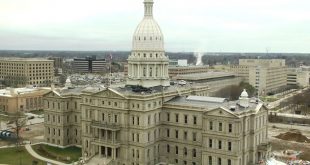Reaction to Governor Gretchen Whitmer’s proposed budget for fiscal year 2020 has been quick, and predictable. The plan focuses on roads, education, and water quality.
Whitmer and State Budget Director Chris Kolb outlined the proposal to a joint session of the House and Senate Appropriations Committees yesterday.
The budget recommendation totals 60.9-billion dollars – up 3.6 percent from 2019.
The flashpoint has been a significant proposed hike in the gasoline tax to provide more money for road and bridge repair. Three 15-cent per gallon increases would be phased in between this October and next October. It would leave Michigan with the highest gas tax in the nation, by a significant margin. The proposal promises some tax relief for lower income, working families. Whitmer estimates it would produce 2.5-billion dollars per year, which would be earmarked for “highly traveled and commercially important” state and local roads.
Democratic leaders have called the budget “bold.” Republican State Representative Greg Markkanen called the gas tax increase unrealistic, saying people would have to take out two loans if they want to drive in Michigan – one to buy a vehicle, and one to operate it. An email request to Markkanen’s publicist for details about Markkanen’s plan for fixing the roads was not answered. Republican State Senator Ed McBroom expressed concern that most of the money from the increase would be funneled away from rural areas, and suggested that a more appropriate fix could start with not siphoning current gas tax revenues away from roads for other projects.
The per-student foundation for K-12 schools would increase by 120 to 180 dollars per pupil, with an emphasis on narrowing the gap between the best-funded and the most poorly-funded districts. Additional funding would be provided for special education and at-risk students, and for an expansion of the Great Start Readiness program. Colleges and universities would receive a three percent increase, as long as tuition doesn’t rise more than 3.2-percent.
The proposed budget also calls for the repeal of the so-called “retirement tax.” Revenue would be replaced by a tax on business entities that are not traditional corporations, that would bring their obligation into line with that of traditional corporations.
 Keweenaw Report Your Source for Local News and Sports
Keweenaw Report Your Source for Local News and Sports





